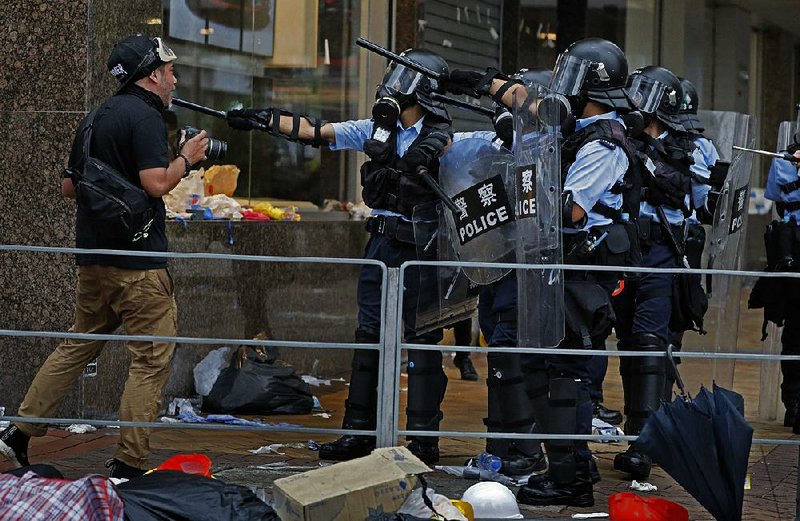HONG KONG -- After a day of sit-ins, tear gas and clashes with police, Hong Kong students and civil-rights activists vowed Wednesday to keep protesting a proposed extradition bill that has caused concerns over greater Chinese control and erosion of civil liberties in the former British colony.
The violence marked a major escalation of the biggest political crisis in years for the semiautonomous Chinese territory and forced the delay of legislative debate on the contentious bill.
College student Louis Wong said he considered the blockade of government headquarters and the Legislative Council a success because it appeared to prevent Beijing loyalists from advancing amendments to a pair of laws that would make it easier to send suspected criminals to China.
"This is a public space and the police have no right to block us from staying here," Wong said, surveying a garbage-strewn intersection in the Admiralty neighborhood that had been blocked off by security forces after protesters broke through a police cordon and entered the government complex.
"We'll stay until the government drops this law and [Chinese President] Xi Jinping gives up on trying to turn Hong Kong into just another city in China like Beijing and Shanghai," he said.
Protesters who had massed outside the government building overnight Tuesday began pressing against the police early Wednesday, leading to police firing tear gas and pepper spray.
The overwhelmingly young crowd overflowed onto a major downtown road as protesters overturned barriers and tussled with police. When some appeared to have breached a cordon around the building, the police responded.
A weekend protest of the extradition measure drew hundreds of thousands of people, and Hong Kong leader Carrie Lam said in a statement early today that the peaceful rally had become a "blatant, organized riot."
At a brief news conference held as the chaos swirled outside on Wednesday afternoon, Police Commissioner Stephen Lo Wai-chung said the "serious clashes" forced police to use pepper spray, beanbag rounds, rubber bullets and tear gas.
Officers also were hurt, some seriously, by rocks, bottles, traffic cones, metal barricades and other items thrown by protesters. Police spokesman Gong Weng Chun defended the use of tear gas and other nonlethal weapons, saying officers wouldn't have had to do so if they weren't facing a threat that could lead to serious injury or death.
As of late Wednesday, at least 72 people were taken to seven hospitals, with two in serious condition, the Hong Kong Hospital Authority said. Of those, 41 were later released, it added.
Lo also called the demonstration a riot, which could mean long jail terms for anyone arrested, adding to fears that Hong Kong's government is using public-disturbance laws to intimidate protesters.
"We condemn such irresponsible behavior," Lo said. "There's no need to hurt innocent people to express your opinions," he said, adding that people should not "do anything they will regret for the rest of their lives."
A government statement said a scheduled 11 a.m. legislative session would be "changed to a later time." Officials gave no indication of when that would be, and Lam canceled a news briefing.
Some businesses also closed for the day, and labor strikes and class boycotts were called.
The protests by the bill's opponents are the largest since pro-democracy demonstrations closed down parts of the Asian financial center for more than three months in 2014.
The demonstrations pose a challenge to Xi, who has said he would not tolerate Hong Kong being used as a base to question the ruling Communist Party's authority. But they are also giving a voice to the young in the territory who feel alienated by a political process dominated by the economic elite.
The protesters said they hoped the blockade would lead to the measure being shelved.
"We want the government to just set the legislation aside and not bring it back," said a protester who gave only his first name, Marco, because he feared possible repercussions from authorities.
Another protester, who gave her name only as King, also fearing repercussions, said the protest was a watershed moment for Hong Kong's young people. "We have to stand up for our rights or they will be taken away," she said.
Under its "one country, two systems" framework, Hong Kong was supposed to be guaranteed the right to retain its own social, legal and political systems for 50 years after its handover from British rule in 1997. However, China's Communist Party has been seen as increasingly reneging on that agreement by forcing through unpopular laws.
A vote on the legislation is scheduled on June 20.
Information for this article was contributed by Raf Wober, Alice Fung, Johnson Lai, Kevin Freking and Sally Ho of The Associated Press.
A Section on 06/13/2019
